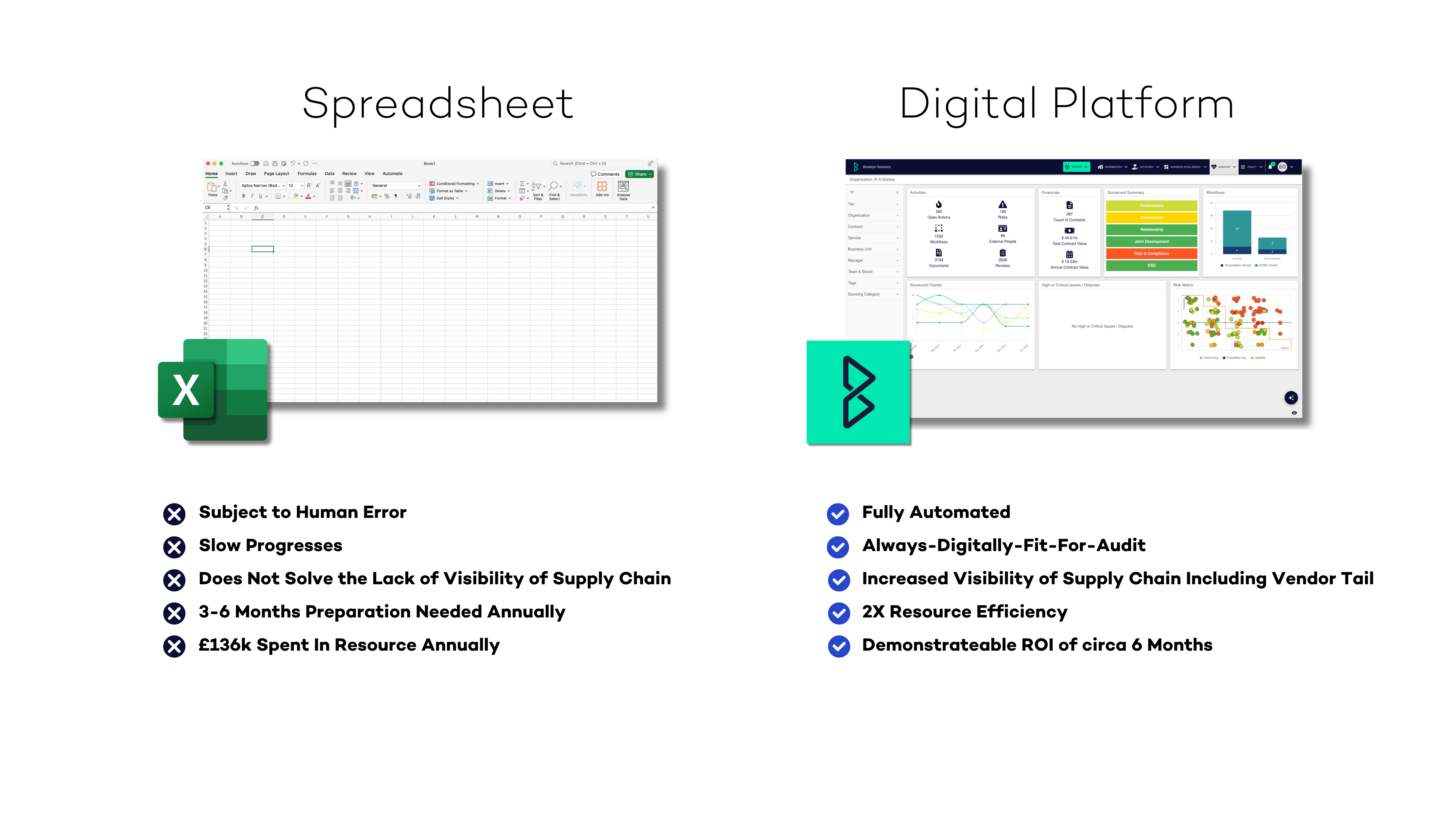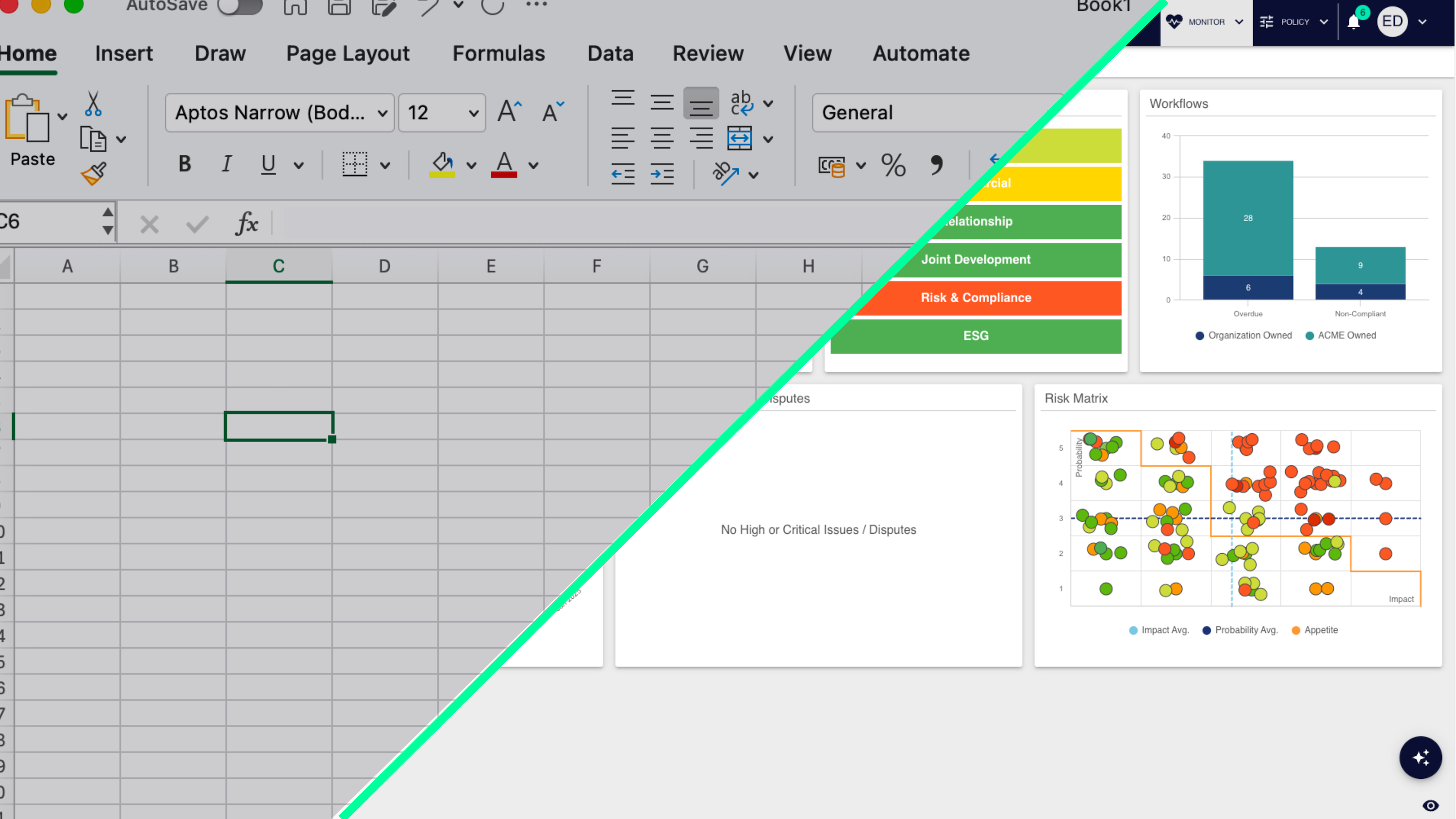Digital Solution Or Spreadsheets For DORA?
The Digital Operational Resilience Act (DORA) has placed significant demands on financial institutions to ensure operational resilience and robust management of ICT systems and third-party suppliers. While many organisations default to spreadsheets as their starting point for compliance, they often find these tools quickly become a burden rather than a solution.
We have assessed how a digital platform compares to using a spreadsheet for your outsourcing register to achieve compliance with DORA, and other outsourcing regulations such as PRA, and EBA. Our findings proved that a digital platform was a far superior choice for managing your compliance and creating a DORA outsourcing register compared to using Excel.
7 Reasons To Use Digital Platforms Over Spreadsheets For DORA

1. Automation Saves Time and Reduces Errors
Spreadsheets rely on manual data entry, which is both time-consuming and error-prone. Digital platforms eliminate these inefficiencies by automating key tasks, such as sending supplier questionnaires, categorising risks, and analysing compliance gaps. This reduces the burden on your team while improving data accuracy.
2. Real-Time Visibility into Risks and Compliance
A spreadsheet can only provide a static snapshot of your data. In contrast, a digital platform offers dynamic, real-time insights through centralised dashboards. You can track supplier risks, incidents, and compliance statuses as they evolve, ensuring you’re always on top of critical issues.
3. Enhanced Collaboration Across Teams
Managing a spreadsheet among multiple stakeholders can be a logistical nightmare, with version control issues and limited visibility into task progress. Digital platforms enable seamless collaboration by providing a single source of truth where teams can assign tasks, track progress, and work together in real-time.
4. Proactive Risk Management with AI Insights
Unlike static spreadsheets, digital platforms leverage AI to continuously monitor supplier risks and identify non-compliance or emerging threats. Automated alerts ensure that your organisation can respond to potential issues before they escalate, keeping your operations resilient.
5. Simplified Regulatory Audits
Preparing for audits is one of the most resource-intensive aspects of compliance. While spreadsheets require weeks or even months of manual data compilation, a digital platform provides an always-ready audit trail. Generating reports for regulators is as simple as clicking a button, saving your organisation valuable time and effort.
6. Scalable Solutions for Complex Supply Chains
Spreadsheets quickly become unwieldy as your supply chain grows. A digital platform is designed to handle complexity, allowing you to manage thousands of suppliers effortlessly. Advanced features like contract analysis, automated workflows, and supplier segmentation ensure that you can scale your compliance processes with ease.
7. Long-Term Cost Savings and ROI
Although spreadsheets seem cost-effective initially, they require significant resources to maintain, especially as compliance demands grow. Digital platforms deliver a measurable return on investment within months by reducing manual labour, improving efficiency, and ensuring robust compliance. Organisations that adopt these tools report up to 2x resource efficiency, freeing up teams to focus on strategic priorities.
The Future of Compliance is Digital
DORA compliance is an ongoing journey, not a one-time project. Relying on spreadsheets is a risky and resource-intensive approach that can leave your organisation vulnerable to fines and reputational damage. A digital platform not only simplifies compliance but also strengthens your operational resilience and prepares your organisation for future regulatory challenges.
Equip your organisation with the tools it needs to thrive in a regulated environment. A GRC System will save you time, reduce costs, and ensure you’re always prepared for the demands of DORA and beyond.



